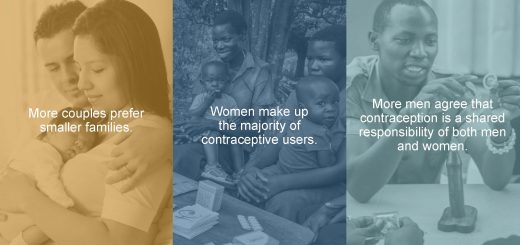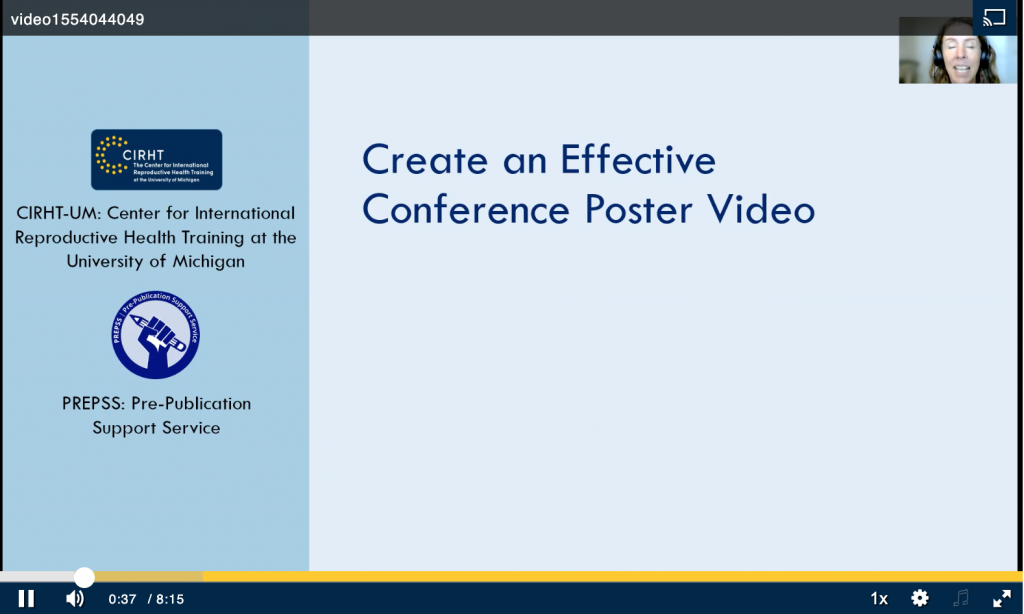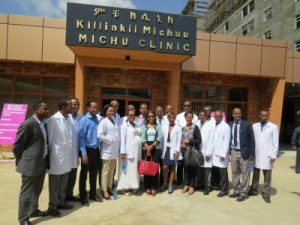News Review – 24 February 2017
The week began with news of the death of the woman referred to as “Jane Roe” in the landmark Roe v. Wade Supreme Court abortion rights case. Her transformation from a staunch abortion-rights advocate to becoming a critic was seized upon as emblematic of the current debate in the US.
The international implications of the new US administration’s policies continue to reverberate, with additional support and pledges for increased Family Planning funding coming from the Netherlands, UK, Norway, Denmark, Finland and others, while Global Citizen has launched an email campaign encouraging the public to get more involved in the “She Decides” movement.
Debates about abortion rights and sex education made the news in Angola and Burkina Faso.
An interesting and counter-intuitive study from the University of Michigan concludes that, “Contrary to prevailing thought, first-time mothers who receive more educational advantages at an early age are more likely to have their first birth result from an unintended pregnancy.” The author, a PhD student in the School of Public Health, calls for a “deeper look into the drivers of intention,” beyond simple access to education and supplies.
The Lancet Global Health and Jhpiego have launched a year-long Global Maternal and Neonatal Sepsis Initiative, with the important goal of developing solutions to reduce maternal and newborn deaths related to sepsis, contributing to SDG 5.
For those working on stigma issues and counseling, the American Philosophical Society has a few interesting insights.
On the FP technology front, several apps which claim to be as effective as traditional contraceptives are being marketed and tested. Natural Cycles, which comes from Sweden, was approved by German certification organization Tüv Süd, and claims that “using the app is as effective as a method of birth control as being on the pill.” Georgetown University Medical Center’s Institute for Reproductive Health has launched a year-long study of another app called Dot (Dynamic Optimal Timing) to “compare its efficacy to other contraceptive methods, and to give rigorous attention to how women are using the app.” A study of the effectiveness of computerized family planning aid Smart Choices concluded that… more research is necessary. Vodafone is “mobilizing maternal health” in Tanzania. Four Rwandan youth innovators each received $10,000 for their entrepreneurial ideas to target reproductive health issues. And a new website, Gynopedia, seeks to become the “go-to sources for women’s health information,” with Wikipedia-style pages for cities around the world that give information on social norms, contraceptive and STI testing availability, and translations of key terms.
The world still needs traditional input into advancing women’s health, as evidenced by Ghanaian queens, Swazi chiefs and a former Ugandan FGM practitioner all working for change in their countries.
Complete News Review References:
General
Dutch minister calls on UK to join safe abortion fund after Trump ban, The Guardian, 24 Feb 2017
No Condoms, No Hormones, No Babies: A Guide to Natural Family Planning, Man Repeller, 23 Feb 2017
The Teaching Workshop: Teaching Abortion, American Philosophical Association, 23 Feb 2017
Gynopedia Is About to Become the World’s Go-To Source for Women’s Health Info, Broadly, 22 Feb 2017
UK to Host Family Planning Summit, Amid Fears of Void Left by Global Gag Rule, Global Citizen, 21 Feb 2017
Send an Email to Governments Championing She Decides and Urge Them to Step Up for Women’s Health, Global Citizen, 22 Feb 2017
Engaging Men in Family Planning, PRB, 21 Feb 2017
Unintended pregnancy: A new conversation is needed, U-M School of Public Health, 21 Feb 2017
Europe raises at least $32.2M to plug ‘global gag rule’ shortfall, Devex, 21 Feb 2017
Boys as well as girls should be told about the evils of FGM, The Guardian, 20 Feb 2017
“Jane Roe” Has Died. Abortion Rights Might Not Be Far Behind., Mother Jones, 18 Feb 2017
Government increases state support for abortion, Norway Today, 18 Feb 2017
Denmark and like-minded countries are encouraging the EU to increase support for women’s sexual and reproductive health and rights, Danish Ministry of Foreign Affairs, 17 Feb 2017
“Family Planning is Future Planning”, Gates Foundation (video), 16 Feb 2017
Call for Proposals has been opened: Women’s rights the focus of government support for INGOs, Finnish Foreign Ministry, 16 Feb 2017
Developing Countries Tackle Mother, Infant Mortality, VOA News, 16 Feb 2017
A Revolutionary Study Puts App-Only Birth Control To The Test, Forbes, 16 Feb 2017
Swedish nuclear physicist just got the world’s first approved birth control app – as effective as the pill but using only mathematics, Business Insider, 10 Feb 2017
10 Ways to improve the quality of care in health facilities, WHO, February 2017
Academic
A Computerized Family Planning Counseling Aid: A Pilot Study Evaluation of Smart Choices, Perspectives on Sexual and Reproductive Health, 21 Feb 2017
Knowledge of obstetric danger signs and associated factors among reproductive age women in Raya Kobo district of Ethiopia: A community based cross-sectional study, BMC Pregnancy and Childbirth, 21 Feb 2017
The Global Maternal and Neonatal Sepsis Initiative: a call for collaboration and action by 2030, The Lancet Global Health, 16 Feb 2017
Long-acting reversible contraceptive acceptability and unintended pregnancy among women presenting for short-acting methods: a randomized patient preference trial, AJOG, February 2017
Consolidated guideline on sexual and reproductive health and rights of women living with HIV, WHO, 2017
Angola
Minister plays down controversy over abortion, Agencia Angola Press, 24 Feb 2017
Opposition calls for referendum on abortion, Agencia Angola Press, 24 Feb 2017
Botswana
Trumps’ global ban on abortion: what does it mean for Botswana, Sunday Standard, 13 Feb 2017
Burkina Faso
Traitement de l’information en matiere de sante de la reproduction : Des journalistes outillés, Le Pays, 17 Feb 2017
Contraception au Burkina : « Les gens s’imaginent qu’on va pervertir leurs enfants », Jeune Afrique, 3 Feb 2017
Ethiopia
Gates underlines the importance of investing in study and research in Africa, Capital, 20 Feb 2017
Ghana
Campaign against unsafe abortion intensifies in Brong-Ahafo, Ghana News Agency, 21 Feb 2017
Adolescents appeal to parents not to shy away from sex talks, Ghana News Agency, 21 Feb 2017
Queens lead fight against illegal abortion, Ghana News Agency, 17 Feb 2017
Nigeria
Nigeria not investing in family planning, Daily Trust, 23 Feb 2017
‘Improved Access To Family Planning Facilities Reduces Maternal Mortality’, The Independent (Nigeria), 22 Feb 2017
All Family Planning Methods Are Efficacious – Umma Bala, The Independent (Nigeria), 20 Feb 2017
Rwanda
Teach teenagers contraceptives use, says Gender minister, New Times, 22 Feb 2017
RBC, partners roll out new family planning tool, New Times, 21 Feb 2017
Young Innovators Triumph at iAccelerator Pitch Contest, New Times, 19 Feb 2017
Senegal
«The challenge initiative» d’Intrahealth offre le modele de survie, Sud Quotidien, 17 Feb 2017
Planification familiale : Le Sénégal se fixe un taux de 45% à l’horizon 2020, Le Soleil, 30 Jan 2017
South Africa
When is an abortion legal?, Bhekisisa, 21 Feb 2017
MSF calls for better access to services for sex abuse survivors, EWN, 17 Feb 2017
Swaziland
Traditional leaders: a crucial entry point for young people’s sexual and reproductive, UNFPA, 15 Feb 2017
Tanzania
Mobilising Maternal Health in Tanzania, Vodafone Foundation, 2016
Uganda
MP criticizes minister Nadduli over encouraging large families, The Monitor, 24 Feb 2017
Uganda’s Coo Makwiri (“Role Model Men”), Voice Male magazine, 23 Feb 2017
Former Ugandan circumciser says she will never go back to performing FGM, UNFPA, 23 Feb 2017
Abortions down, but girls even more brazen with unsafe measures, The Observer, 22 Feb 2017
Parliament probes will not stop maternal deaths, The Monitor, 22 Feb 2017
Rights activists are agents of the devil – Papal Nuncio, The Monitor, 20 Feb 2017






